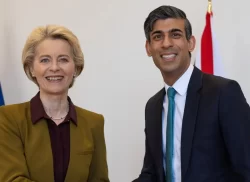How the UK, Irish and European newspapers reacted to Northern Ireland deal
British Prime Minister Rishi Sunak hails a ‘new chapter’ in relations with the EU after a Northern Ireland Brexit deal guarantees the free flow of goods, an emergency brake on new EU laws and the removal of trade barriers across the Irish Sea.
This saga has been going on since 2016, with various prime ministers at the helm and specialist negotiations teams battling to find a resolution that maintained the UK’s sovereignty while the EU negotiators were charged with protecting the flow of goods within the EU to Northern Ireland.
After billions in costs, It has finally come to a resolution. So here is an outline of how the media’s reacted to this deal in Europe and around the EU.
Such was the significance and importance of the news that most of the newspapers are dominated by the news of the Brexit deal this morning and heavily covered across the European newspapers.
UK Newspapers Reaction
The Times headline reads “Brexit Breakthrough”, while the Daily Mail asks “Has Rishi Done The Impossible?” In its editorial, the Daily Telegraph praises Prime Minister Rishi Sunak, saying Monday was “arguably his best day yet as prime minister”.
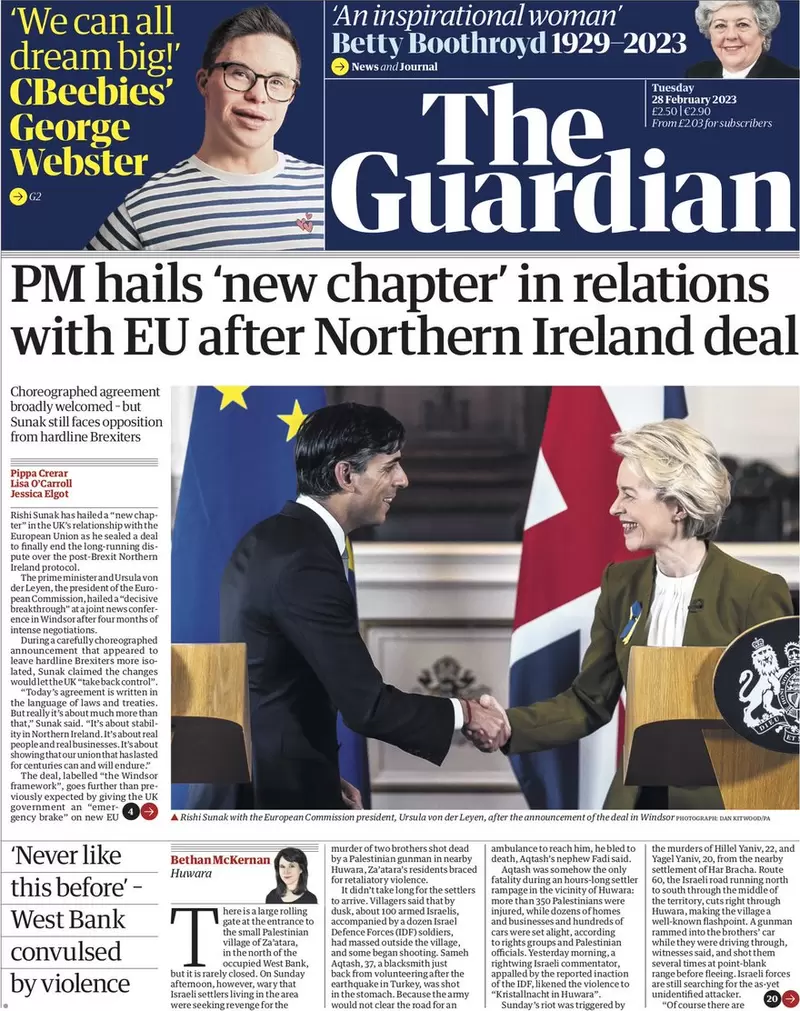
The Metro’s headline states “1,215 days late… Brexit deal is finally done”, while The Sun declares “Got Brexit done… again (hopefully)”. Inside the paper, the foreign secretary, James Cleverly, has written an article in which he says the agreement is a “turning point for Northern Ireland”.
The Guardian reports that the deal has been broadly welcomed, but hardline Brexiteers remain opposed, and the DUP has sounded a warning over the claim that Stormont will be able to veto new European law, according to the i. The paper also says Boris Johnson is weighing up whether or not to intervene.
Interestingly, the left-wing Daily Mirror makes no mention of the deal on its front page, whilst the Sun gives the news a small section at the top of the paper.
PM Rishi Sunak just spent 2 minutes on a broadcast boasting about how Northern Ireland is the “most exciting investment zone on the planet” because it has full access to the UK and EU markets… Isn’t this how it was before? like we did before Brexit!
Irish Newspapers Reaction
In an editorial, the Irish Times sees the deal as a “route to stability and progress”, but acknowledges that no agreement is going to satisfy everyone.
Sam McBride of the Belfast Telegraph, in his column, is critical of the deal, saying that the reality is that the Irish Sea border will remain in place.
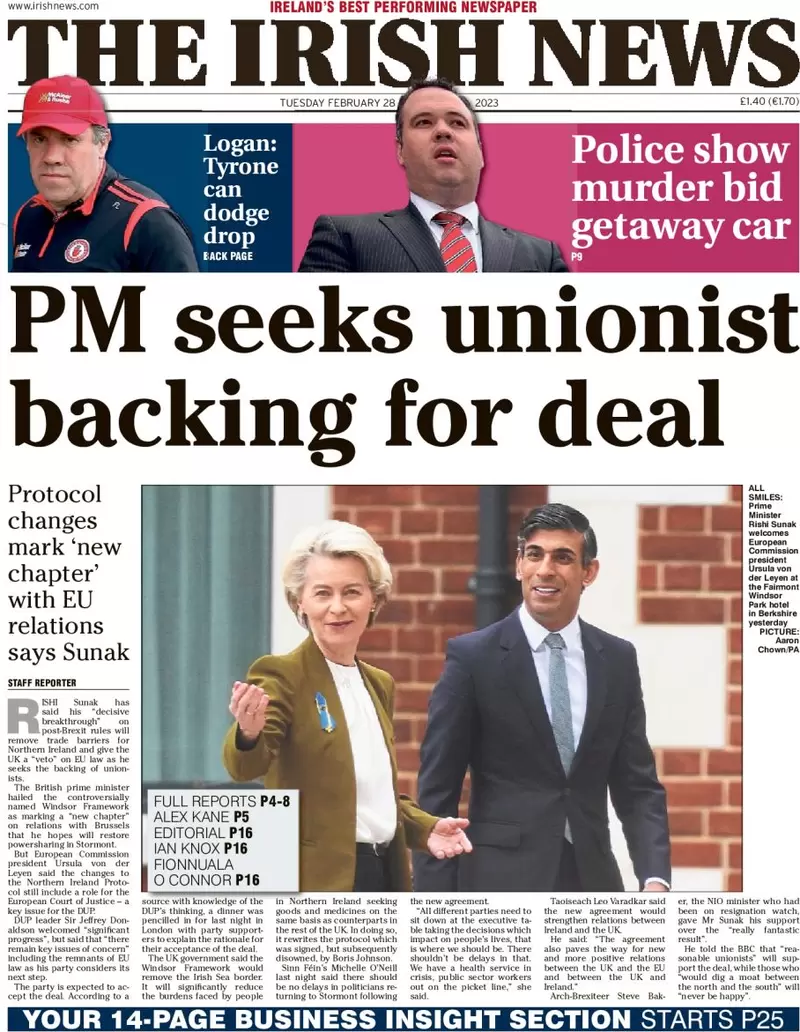
European Newspapers Reaction
The settlement of the EU’s acrimonious post-Brexit dispute with the UK over Northern Ireland has been embraced by continental media, who see it as a potential harbinger of a mature relationship that was previously inconceivable under the unreliable leadership of Boris Johnson at Downing Street.
France’s Le Monde called the Windsor framework a significant breakthrough. “The European Commission would probably not have agreed to these concessions with former prime minister Boris Johnson, in whom it had lost confidence,” the paper said in an article suggesting the two sides were “aiming for new, more peaceful” ties.
Johnson “told untruths about the protocol, claiming there would be no checks on goods crossing the Irish Sea, and challenged it soon after endorsing it”, Le Monde said, adding that while Rishi Sunak might be a Brexiter, he was “hard-working and pragmatic”.
On Tuesday, an editorial in the paper noted that Sunak’s strategy marked a departure from Johnson’s approach, which appeared to be centred on constant conflict with the UK’s 27 European partners, and represented “a new chapter in the tumultuous history of Brexit.”
While the Windsor framework had yet to be accepted by unionists and hardline Brexit supporters, Sunak’s bold bet was to move beyond the never-ending disputes with the EU, particularly as UK voters had witnessed the negative repercussions of Brexit.
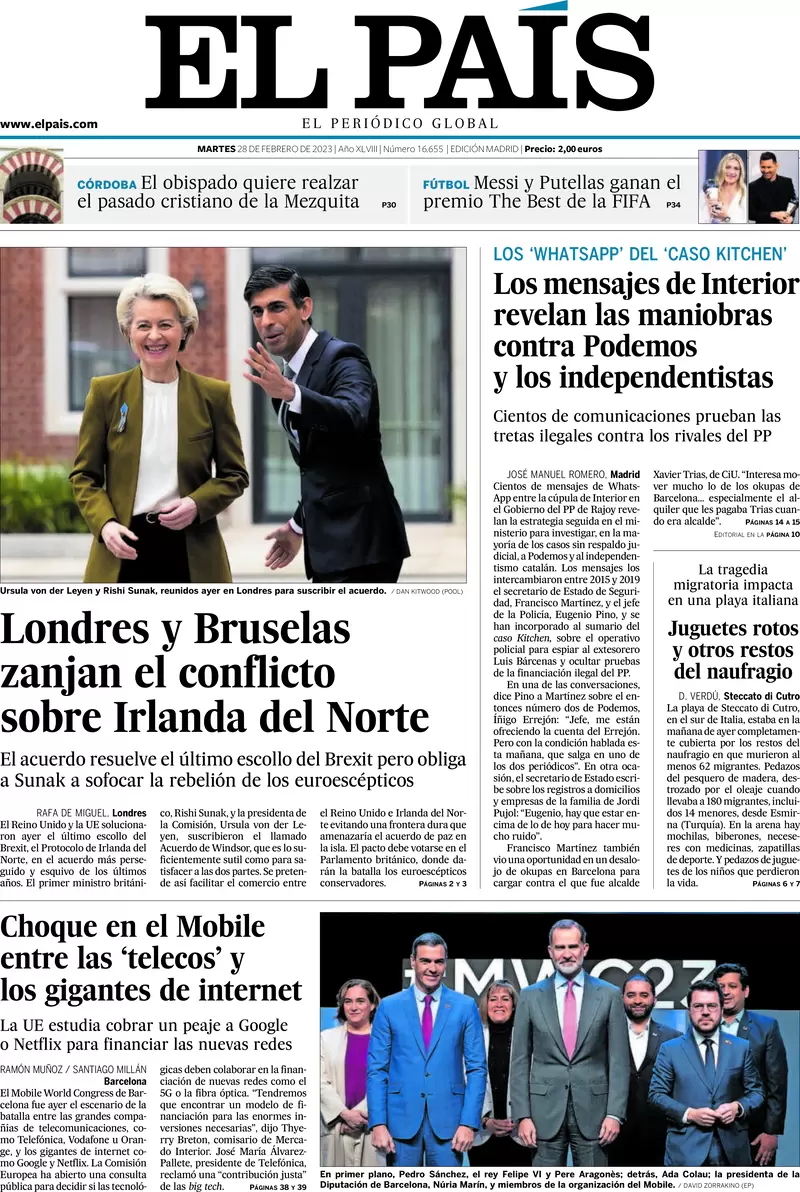
It was vital that the EU and the UK respond “with one voice” to crises such as the war in Ukraine and global heating, the paper said, adding that both had every interest in “abandoning post-Brexit guerrilla warfare” for a “peaceful, adult relationship”.
France’s President Emmanuel Macron hailed the deal as an important decision” that would “preserve the Good Friday agreement and protect our European internal market.”
Handelsblatt, a German newspaper, offered a poetic description of Monday’s announcement, likening it to the process of ex-partners reconciling after a period of hurt, blame, and teasing, ultimately finding a new way of relating to each other.
But the paper cautioned against viewing this as the “makeup of the decade,” as it was not a definitive return for Britain to the EU’s embrace. Instead, it was only a “repair manual” aimed at addressing the harm caused to Northern Ireland by Brexit.
De Volkskrant, a Dutch newspaper, suggested that the talks regarding the protocol had been protracted due to the British government’s inability to identify what they wanted, while simultaneously sending out negotiators without adequate authority or competence, a situation that persisted until Sunak’s involvement.
According to the paper’s correspondent in London, the prime minister displayed shrewdness in his handling of the situation. Despite Johnson’s claims of having “got Brexit done,” the task was far from finished.
“That required a leader who does not shy away from difficult dossiers or deliberately set out to rile Brussels, who puts national interest above personal ambition, understands economics and is blessed with a dose of pragmatism.”
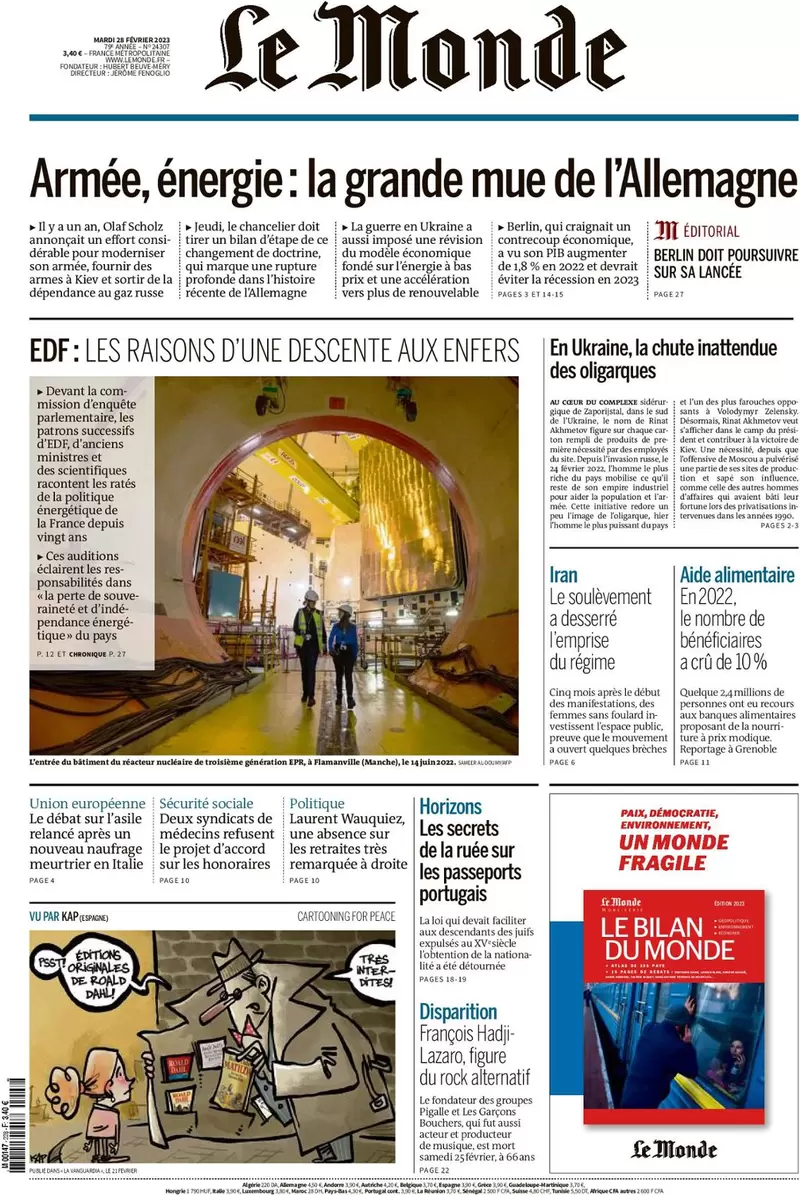
Such a leader, the paper said, “turned out to be Sunak … He seems to have achieved a historic success. There is now a deal that Johnson would have signed immediately.” For the time being at least, the former prime minister “has been outplayed”.
Welt, a German newspaper, cautioned that Sunak’s position was still precarious. The deal represented a “political poker game,” according to the paper’s correspondent in London, who observed that Johnson held a grudge against Sunak since he quit as chancellor in July 2022, which led to the mass exodus of staff, and ultimately the former prime minister’s downfall.
While the PM was unlikely to lose a Commons vote, any large rebellion would “make governing even more difficult for Sunak, who faces multiple challenges – and significantly improve Boris Johnson’s position as a possible Tory saviour”.
Spain’s El País said the deal seemed to have taken the wind out of many Brexiters’ sails. “The tone of the Conservative Eurosceptics and the recalcitrant Northern Ireland has been much calmer and more prudent than anticipated,” the paper said.
What is the Northern Ireland protocol?
The Northern Ireland Protocol is a part of the Brexit agreement between the United Kingdom and the European Union, which was signed on December 24, 2020, and came into effect on January 1, 2021. The protocol was designed to address the issue of the border between Northern Ireland, which is part of the United Kingdom, and the Republic of Ireland, which is a member state of the European Union.
The protocol has been a controversial issue since it was introduced, with some groups in Northern Ireland and the UK arguing that it creates a border in the Irish Sea and undermines Northern Ireland’s place within the UK. Others argue that it is necessary to protect the peace process and ensure the continued absence of a hard border on the island of Ireland.
What’s the new deal Northern Ireland Brexit deal?
Green lane/red lane
- Goods from Britain destined for Northern Ireland will travel through a new “green lane”, with a separate “red lane” for goods at risk of moving onto the EU
- Products coming into Northern Ireland through the green lane would see checks and paperwork significantly reduced
- Red lane goods destined for the EU still be subject to normal checks
- Mr Sunak said this would mean food available on supermarket shelves in Great Britain will be available on supermarket shelves in Northern Ireland
- New data-sharing and labelling arrangements would be used to oversee the new system
- Where smuggling is suspected, some custom checks may still be carried out on green lane goods
- Businesses moving goods from Northern Ireland to Great Britain would not be required to complete export declarations
- Bans on certain products – like chilled sausages – entering Northern Ireland from Britain would be scrapped
- Bans also lifted on seed potatoes and 11 native British trees
Pets, parcels and medicines
- No new requirements for moving pets from Northern Ireland to Britain
- Pet owners visiting Northern Ireland from Britain (but not travelling on to Ireland) only have to confirm their pet is microchipped and will not move into the EU
- Under old rules, pet owners had to have vet-issued health certificates and proof of up-to-date rabies vaccination, while dogs needed tapeworm treatment before every visit
- Medicines for use in Northern Ireland would be approved by the UK regulator, with the European Medicines Agency not having any role
- Parcels will not be subject to full custom declarations
- From 2024, parcel operators required to share data with the EU to manage smuggling risks
VAT and alcohol duty
- Under the Northern Ireland Protocol, EU VAT rules could be applied in Northern Ireland
- Under the new deal, UK VAT and excise rules will apply to Northern Ireland for alcoholic drinks for immediate consumption and immovable goods such as heat pumps
- EU VAT rules will still apply for other items
Stormont brake
- Under the protocol, some EU law applies in Northern Ireland, but politicians had no formal way to influence the rules
- The new agreement reduces the proportion of EU rules applied in Northern Ireland to less than 3%
- European Court of Justice continues to be the final arbiter in disputes over these remaining rules
- The deal introduces a “Stormont brake” which allows the Northern Ireland Assembly to raise an objection to a new goods rule
- The process would be triggered if 30 MLAs (representatives in the Stormont) from two or more parties sign a petition
- The brake cannot be used for “trivial reasons” but reserved for “significantly different” rules
- Once the UK tells the EU the brake has been triggered, the rule cannot be implemented
- It can only be applied if the UK and EU agree
- This new process is not subject to oversight by the European Court of Justice oversight
- Disputes would be resolved through independent arbitration
- The EU has its own safeguard – if Northern Ireland starts to diverge significantly from the bloc’s rules, the EU has the power to take “appropriate remedial measures”
Northern Ireland Bill scrapped
- The government has confirmed it is ditching the Northern Ireland Protocol Bill
- The controversial legislation, introduced under ex-PM Boris Johnson, would have given the UK the power to scrap the old protocol deal
- Legal opinion published by the government says there is now “no legal justification” for going ahead with it

